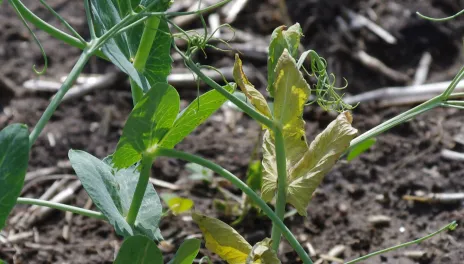Integrated management of Aphanomyces and Fusarium root rot in field peas
Multi-year, multi-location research conducted by NDSU indicates that losses to Aphanomyces and Fusarium root rot in field peas can be sharply reduced through the integrated use of planting date, fungicide seed treatment, crop rotation, and field pea variety selection. Each of these management tools confers partial management of this root disease complex, and excellent management of Aphanomyces and Fusarium root rot has been achieved by integrating these strategies.
When crop rotation intervals are tight, planting date and field pea variety selection are critical for achieving commercially acceptable field pea agronomic performance under root rot pressure. The use of extended crop rotation intervals (minimum 5 years out of peas or lentils) facilitates some degree of flexibility relative to planting date and field pea variety selection, but planting date and field pea variety selection are critical tools for achieving commercially acceptable field pea yields under Aphanomyces and Fusarium pressure even with extended crop rotation intervals. Fungicide seed treatments are highly effective against Pythium and Rhizoctonia, and early planting, which facilitates the establishment of peas before soil temperatures become favorable for the pathogens causing Aphanomyces and Fusarium root rots, increases the risk of losses to Pythium and Rhizoctonia. In field peas planted early in fields with elevated Aphanomyces and Fusarium pressure, fungicide seed treatments have conferred average yield gains of 4 to 7 bu/ac.
Full research findings are available as summary PDFs and explanatory YouTube videos at https://www.ndsu.edu/agriculture/ag-hub/research-extension-centers-recs/carrington-rec/research/plant-pathology.
On-farm research studies building on these research findings are planned for locations in western and central North Dakota in 2025.
Michael Wunsch, Ph. D.
Michael.Wunsch@ndsu.edu
Research Plant Pathologist
